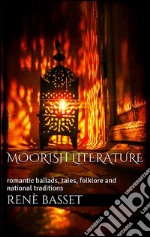Rene Basset eBooks
eBooks di Rene Basset
Moorish literature. E-book. Formato EPUB René Basset - Pubme, 2015 -
The Moorish ballads which appear in this volume are selected from a unique department of European literature. They are found in the Spanish language, but their character is oriental; their inspiration comes from the Mahometan conquerors of northern Africa, and while they exhibit a blending of Spanish earnestness and chivalry with the wild and dashing spirit of the Arab, they present a type of literature which is quite unparalleled in the Latin and Teutonic countries of the Mediterranean basin.
Moorish literature. E-book. Formato Mobipocket René Basset - Pubme, 2015 -
The Moorish ballads which appear in this volume are selected from a unique department of European literature. They are found in the Spanish language, but their character is oriental; their inspiration comes from the Mahometan conquerors of northern Africa, and while they exhibit a blending of Spanish earnestness and chivalry with the wild and dashing spirit of the Arab, they present a type of literature which is quite unparalleled in the Latin and Teutonic countries of the Mediterranean basin.
Moorish Literature: Comprising Romantic Ballads, Tales of the Berbers, Stories of the Kabyles, Folk-Lore and National Traditions. E-book. Formato PDF René Basset - Forgotten Books, 2017 -
The region which extends from the frontiers of Egypt to the Atlantic Ocean, and from the Mediterranean to the Niger, was in ancient times inhabited by a people to whom we give the general name of Berbers, but whom the ancients, particularly those of the Eastern portion, knew under the name of Moors. "They were called Maurisi by the Greeks," said Strabo, "in the first century A. D., and Mauri by the Romans. They are of Lybian origin, and form a powerful and rich nation." This name of Moors is applied not only to the descendants of the ancient Lybians and Numidians, who live in the nomad state or in settled abodes, but also to the descendants of the Arabs who, in the eighth century A. D., brought with them Islamism, imposed by the sabre of Ogbah and his successors. Even further was it carried, into Spain, when Berbers and Arabs, reunited under the standard of Moussa and Tarik, added this country to the empire of the Khalifa. In the fifteenth century the Portuguese, in their turn, took the name to the Orient, and gave the name of Moors to the Mussulmans whom they found on the Oriental coast of Africa and in India.The appellation particularizes, as one may see, three peoples entirely different in origin - the Berbers, the Arabs of the west, and the Spanish Mussulmans, widely divided, indeed, by political struggles, but united since the seventh and eighth centuries in their religious law. This distinction must be kept in mind, as it furnishes the necessary divisions for a study of the Moorish literature.

